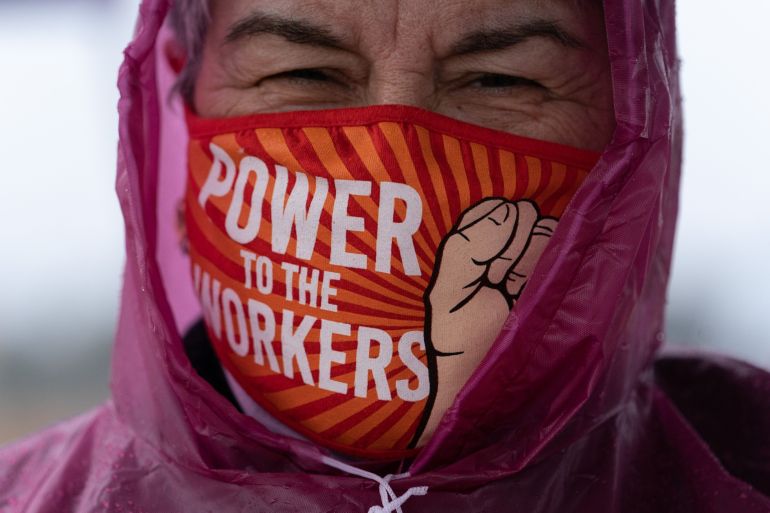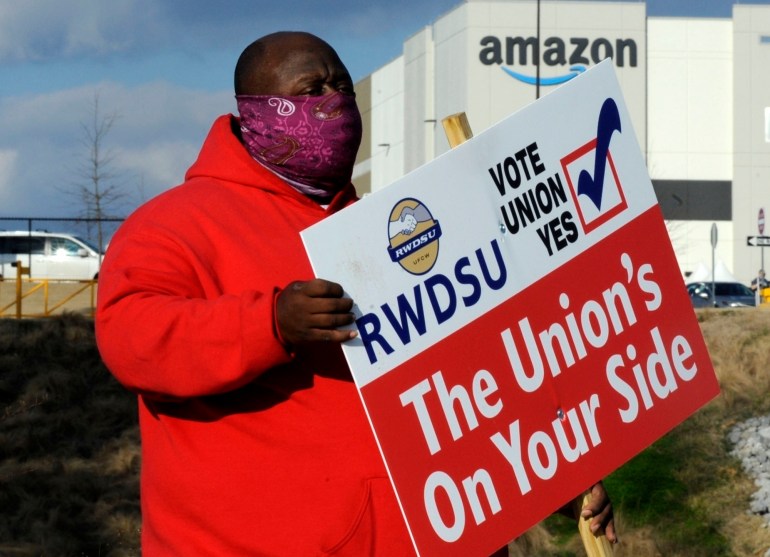Amazon shareholder meeting: Push to put an hourly worker on board
The effort by activists to elevate labour concerns within Amazon comes amid allegations of monopolistic practices and environmental racism.

On the heels of a failed Amazon.com Inc union drive in the United States last month, labour activists are hoping that a company shareholder meeting on Wednesday will culminate in a worker joining the e-commerce giant’s board of directors.
A shareholder resolution backed by some investors, including Oxfam America, demands that the Seattle-based corporation put an hourly labourer on the governance board that makes key financial and management decisions.
Keep reading
list of 4 items‘Pure veg fleet’: How Indian food app Zomato sparked a caste, purity debate
Trapped, abandoned: Filipino workers lured to Poland by shadowy agents
EU countries endorse diluted draft rules on gig economy workers’ rights
The proposal would broaden the influence of employees — and the communities where Amazon runs fulfillment centres — in a larger corporate push to enhance the power of other stakeholders beyond ownership and executives.
In an unexpected move, proxy adviser Institutional Shareholder Services (ISS) has recommended that shareholders approve the proposal, though Amazon’s board itself is against the resolution.

The Amazon board also opposes resolutions to appoint an independent chair, release disclosures regarding potential anticompetitive practices and implement a racial equity audit.
Few big companies in the US offer a worker a seat at the board table. But the issue has gained visibility with an increased focus on social justice and income inequality.
Last month, employees at Amazon’s warehouse in Bessemer, Alabama, overwhelmingly rejected a proposal to form the company’s first union in the US.
Jennifer Bates, a worker at Bessemer who voted in favour of the union, is to deliver remarks to the shareholder meeting in which she says that having board representation “would send a signal that our voices matter”.
“I know, from my own experience working at Amazon, that it does not listen to its workers,” says Bates. “I have tried on many occasions to raise concerns about workplace safety, scheduling and discipline.”
‘Employees’ perspectives are valuable’
Sarah Zoen, Oxfam America’s senior policy adviser, said the board resolution is symbolic.
“While we would love to get a high vote total, we don’t expect this proposal to pass,” she told Al Jazeera. “That said, we don’t file these types of proposals with the aim to get it passed.”
“We use the resolution as an opportunity to highlight labour issues in a company’s own operations, as well as surface other human rights concerns throughout its supply chain and ultimately push for company action and increased accountability,” said Zoen.
The business community is increasingly realising that employees’ perspectives are crucial to boards, she added.
A recent survey by the Council of Institutional Investors on employee access to boards at S&P 100 companies showed growing support for policies that encourage director interaction with employees.
The vast majority, 97 percent, had policies that board members have access to either management or employees. Around half had company policies giving board members access to all employees, while 36 percent have a process through which boards can interact with employees.
Oxfam is part of a global coalition, Make Amazon Pay, which focuses on workers’ rights.
“Amazon could be a leading US company in this space,” Zoen said. “We are losing confidence in Amazon to truly address these concerns if commitments aren’t carried out.”

‘We need a better vision’
A spokesperson at Amazon declined to comment to Al Jazeera specifically on the board resolution.
However, the company’s 2021 proxy report (PDF) contains full responses to all of this year’s shareholder proposals.
“We have also long recognized the importance of employees’ participation in our decision-making processes,” says the company in its investor relations material. “Our global workforce of approximately 1.3 million employees consists of widely diverse people with widely diverse jobs, from software development, to product development and product sourcing roles, to staffing customer service centers, fulfillment centers, data centers, and physical stores.”
The statement continued by saying that Amazon has a variety of policies “to promote consistent, honest, and open engagement with our employees … to continuously improve our workplace and employee experience”.
In his most recent shareholder letter, Amazon CEO Jeff Bezos said he is “proud of the fact that Amazon is a company that does more than just create jobs for computer scientists and people with advanced degrees”.
“Despite what we’ve accomplished, it’s clear to me that we need a better vision for our employees’ success,” Bezos wrote. “I am committing us to an addition. We are going to be Earth’s Best Employer and Earth’s Safest Place to Work.”
‘Best left to management’
Delta Air Lines Inc and United Airlines Holdings Inc are among the only US companies to have employee representation on their boards, and such shareholder resolutions have yet to generate much traction at many companies. But ISS support could be decisive at Amazon.
Even without a majority voting in favour, the resolution could still lead to significant changes.
Glass Lewis, another proxy adviser, is not supporting the resolution to have representation by an hourly associate on the board out of concerns for board independence and dilution of shareholder value.
“Glass Lewis believes that board recruitment policies are best left to management,” said an analysis in the firm’s Amazon proxy paper prepared for Wednesday’s meeting.
“Requiring that the Company consider nominees from a relatively narrow group negates the principle of selecting the most qualified directors to serve on the board at any given time,” it continued.
The rights of employees have been highlighted alongside the concerns of customers and the negative impacts on communities living near Amazon distribution hubs.
This week, Amazon has been dogged by regulatory pressure, as the attorney general for Washington, DC accused the company of engaging in anticompetitive practices.
And the spotlight has also pointed towards environmental racism, with some climate activists at the company alleging — as part of the proposed racial equity audit — that Amazon’s facilities cause disproportionate pollution in minority neighbourhoods.